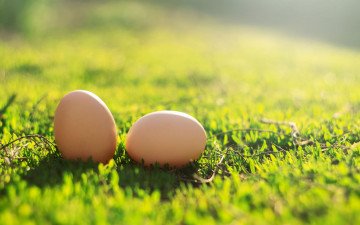
13 Essential Nutrients and Vitamins in Eggs
The humble egg. Delicious, nutritious and simply the perfect element for adding nutritional value into any meal – at any time of day. Not only are they readily accessible and easy to prepare, but eggs are also jam-packed with an impressive variety of vital nutrients – making them one of the healthiest foods to eat on the planet.
Naturally low in fat with just 310 kilojoules squeezed into a standard egg – a serving of eggs contains 13 different essential vitamins and nutrients, alongside one of the greatest sources of choline available. Still not convinced? We agree. It's hard to believe all these incredible health benefits. So here's the full breakdown below of our favourite vitamin-packed superfood.
What Vitamins & Nutrients Are Found in Eggs?

Vitamin D
Vitamin D plays an important role in calcium and phosphorus absorption, making it essential for the maintenance of healthy bones and teeth. More than just the 'sunshine vitamin’, it also contributes to maintaining regular muscle function and supporting your immune system.
Now, egg yolks are one of the few foods that contain naturally high amounts of vitamin D, with a serving of two eggs providing 82% of your recommended daily intake.
For more information on the benefits of Vitamin D in eggs, click here.
Vitamin B12
Vitamin B12 is essential in the formation of red blood cells and DNA, repairing body tissue, and maintaining the healthy function of the immune and nervous systems.
Unfortunately, B12 deficiency is common, especially in the elderly, sometimes leading to fatigue, weakness, weight loss, decreased appetite, dizziness, constipation, and more. As the human body is incapable of producing vitamin B12 on its own, it's necessary to be active in consuming foods that are a rich source of this vitamin.
The recommended daily intake of B12 is about 2µg, with a serving of two eggs satisfying 15% of your everyday requirements.
Choline
Choline is a little-known yet important nutrient that plays a vital role in brain development and function – essential in prenatal human health as well as adulthood. Choline is also used by the body to assist with liver and nerve function.
The human body can produce choline but not in the sufficient amounts needed daily by your body, meaning the rest of those needs can only be satisfied through diet.
Eggs, in particular, are a major source of choline. Two eggs can provide 77% of women’s recommended daily intake and 59% of RDI for men.
For more information about choline in eggs, click here.
Iron
Iron is an essential dietary mineral that is involved in various primary functions, including the transport of oxygen throughout the body and providing energy for daily life.
Despite its importance, an estimated one in eight Australians is iron deficient, which can lead to a limited supply of oxygen to tissues and organs, fatigue, headaches, insomnia, and appetite loss.
With your body absorbing only a fraction of the iron within the food you eat, the case for actively consuming iron-rich meals is even more important.
One large egg contains 0.9mg of iron, found predominantly in the yolk. An average serving of two eggs provides 14% of your RDI for iron.
Lutein and Zeaxanthin
Lutein and zeaxanthin are vital antioxidants, which protect your cells from damage. Most notably, they support the clearance of free radicals and serve in protecting against eye conditions.
As carotenoids, they are naturally present in foods, especially in dark green leafy vegetables, such as spinach and kale – as well as in egg yolks. However, due to their high bioavailability and not being subject to seasonal variation, the consumption of eggs is a favourable source of lutein and zeaxanthin in the diet.
There is currently insufficient research to indicate an exact level of recommended dietary intake for lutein and zeaxanthin, although some researchers have recommended levels as high as 6mg per day.
One serve of two eggs contains around 530µg of lutein and zeaxanthin, alongside being an effective vehicle for increased and site-specific antioxidant uptake.
For more information about the role of eggs in supporting eye health, click here.

Riboflavin (Vitamin B2)
Riboflavin – also known as vitamin B2 – is necessary for cell growth, energy metabolism, red blood cell development, healthy vision, and the sound functioning of the nervous system. It also serves as an antioxidant nutrient, fighting damaging particles in the body known as free radicals.
Bacteria in your gut can produce small amounts of riboflavin, but not enough to meet sufficient dietary needs or store any as a backup – making the case to incorporate effective amounts in your diet even more important. To make it easy, a serving of two eggs contains 24% of your RDI of Riboflavin.
Pantothenic Acid (Vitamin B5)
Pantothenic acid, commonly known as vitamin B5, plays a significant role in converting the food you consume into active energy and breaking down fats. It also aids in the making of vitamin D and the production of red blood cells that carry oxygen around the body.
Though uncommon when following a healthy and balanced diet, a deficiency in vitamin B5 may result in fatigue, irritability, numbness, and muscle cramps, among other symptoms.
A serving of two eggs provides you with 22% of the RDI of Pantothenic acid.
Vitamin A
Vitamin A is vital in sustaining healthy skin, supporting immune function, maintaining good vision and promoting general reproductive health.
Drawing sufficient vitamin A from within your diet should prevent any symptoms of deficiency, including hair loss, skin problems, dry eyes and an increased risk of infections.
With the recommended daily intake for vitamin A set at 750µg, a serving of two eggs delivers 14% of the advisable amount.
Vitamin E
Vitamin E has beneficial antioxidant properties that play a pivotal role in maintaining good general health – including heart health – with studies linking it to lower rates of heart disease.
Studies have also found significant links between vitamin E and immune function, helping the prevention of certain cancers, a reduction in age-related eye disorders, and slowing cognitive decline associated with ageing.
An average serving of two eggs provides 20% of the RDI of vitamin E.
Phosphorus
Phosphorus is essential for the development and maintenance of healthy bones and teeth, filtering waste and repairing tissue and cell membranes. It also contributes to supporting energy metabolism and muscle growth.
Low levels of phosphorus can result in a loss of appetite or joint pain, and irritability or anxiety.
With adults needing around 1000mg of phosphorus per day, a modest serving of two eggs provides 21% of this daily requirement.
Folate
Folate is an important nutrient for people of all ages, playing a significant part in promoting red blood cell growth, the formation of DNA and supporting an effective immune system. In particular for pregnant women, folate helps in the production of new cells, protecting against serious birth defects, such as spina bifida.
It’s recommended that an average adult consume about 200µg of folate daily (more in pregnancy), and a serving of two eggs will provide 49% of your RDI.
To find out more about the important role of eggs in pregnancy, click here.

Iodine
Iodine is an important mineral in helping your thyroid to produce hormones to regulate your body’s metabolic rate. It also serves in promoting cognitive function, optimal brain development and maintaining healthy skin.
Iodine deficiency can be quite common, leading to various health conditions such as swelling of the thyroid gland and ongoing fatigue.
Eating just two eggs a day helps you reach 29% of your daily recommended iodine intake.
Selenium
Although only required in trace amounts compared to other vitamins and minerals, selenium is an important antioxidant that helps prevent free radical damage to cells in the body. Selenium supports the immune system, thyroid gland function, and the maintenance of healthy hair and nails.
Eggs are an excellent source of selenium, with an average serving of two eggs meeting 41% of your daily recommended intake.
Nutritional Information Panel (NIP)
Australian Eggs Nutrient Analysis 2018
Conducted by National Measurement Institute (NMI), a division within the Department of Industry, Innovation and Science
| Nutrient | 2018 average qty per 100g |
| Retinol (vitamin A) | 98mcg |
| Riboflavin | 0.4mg |
| Thiamin | 0.05mg |
| Vitamin B6 | 0.02mg |
| Vitamin B12 | 0.33mcg |
| Biotin | 5.2mcg |
| Folate | 88mcg |
| Vitamin D | 7.9mcg |
| Vitamin E | 1.9mg |
| Pantothenic acid | 1.07mg |
| Potassium | 131mg |
| Magnesium | 12mg |
| Phosphorus | 171mg |
| Iron | 1.8mg |
| Selenium | 28mcg |
| Zinc | 1.0mg |
| Iodine | 47mcg |
Powered By Eggs
We're active in our mission to show you how to live your best life #PoweredByEggs. Drawing from a range of experts and the latest studies, we plan to highlight how holistic health outcomes are positively impacted by eating eggs.
From providing vitamin D for immunity, boosting mental health, to enjoying a post-workout meal that fuels muscle recovery - we want all Australians to know that eating eggs is a vital part of living a happy, healthy and balanced lifestyle.
You can learn about all the latest in our Powered By Eggs initiative here
Frequently Asked Questions
What Vitamins Are Found In Eggs?
- Riboflavin (Vitamin B2)
- Vitamin D
- Vitamin E
- Pantothenic Acid (Vitamin B5)
- Vitamin B12
- Vitamin A
What Nutrients Are Found in Eggs?
- Iron
- Phosphorus
- Folate
- Iodine
- Selenium
What Is Choline and Why Is It Important?
Choline is a little-known yet important nutrient that plays a role in brain development and function. It is also used by the body to help with liver and nerve function. This makes choline essential in prenatal human health as well as adulthood.
Related Articles

Calories in Eggs
Eggs aren’t just delicious, they’re also incredibly nutritious.
Whether you prefer boiled, scrambled, or poached, eggs are a great source of high quality protein. At just 74 calories per egg (310 kJ), they are one of the healthiest foods you can eat.
Vitamin D in Eggs
Around 20% of Australian adults (~3. 3 million people) have a mild or moderate vitamin D deficiency. A further 43% is classified as having insufficient circulating vitamin D concentrations. In the cooler months, these deficiency levels can almost double.

Choline in Eggs
Australian and international studies are increasing our awareness and understanding of the essential nutrient choline but many people still don’t know what it is or why it’s so important for our health.
Want to see what an egg farm looks like? Take this interactive 360 degree tour to see how eggs are produced in Australia.

 >
> 

